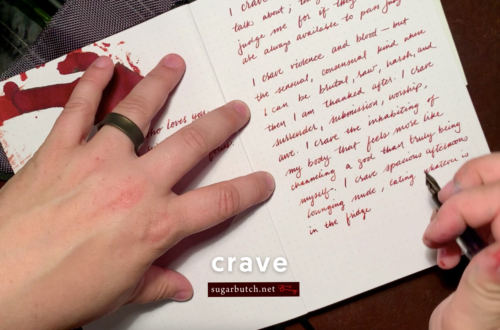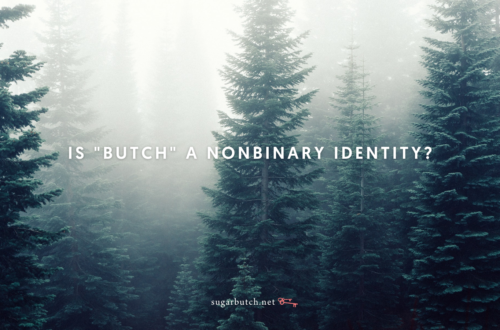In the recent past, gender activists have tended to use the term “bio” to define non-trans folks. As in, bio-male, bio-women, bio-guys.
But let’s think about this a minute eh? There’s nothing non-biological about trans folks.
The words cisgender and cissexual are becoming more and more prevalent for describing non-trans folks – folks whose subconscious/internal sense of your own gender identity generally matches that of your biological sex.
The word has its origin in the Latin-derived prefix cis, meaning “on the same side” as in the cis-trans distinction in chemistry.
Julia Serano has been significantly altering my own perception about cis/trans issues, particularly within feminism. Though I haven’t read it yet, I highly recommend her book Whipping Girl: A Transsexual Woman on Sexism and the Scapegoating of Femininity, and I will be writing up a review of it eventually. I also recommend Serano’s recent article Rethinking Sexism: How Trans Women Challenge Feminism from AlterNet on August 5, 2008 (beware, many comments are hard to read – attacking, misunderstood, incensing). Serano was one of the speakers at the Femme Conference, and it’s clear her work is really cutting-edge of the gender activism and theory, and I’m really excited to read more of her philosophies.
I’ve got a thousand things to say about cis privilege and the social construction theories that have been prevalent in gender studies thusfar. Sadly, I haven’t finished writing that up yet. But I hope to, eventually.
See also: The Cisgender Privilege Checklist over at Questioning Transphobia.




God! I remember the first time I heard the term (cisgendered), and I was like, "What is that?!" I felt SO behind the times. Language changes so quickly and it somehow often remains inadequate. Like in your discussion above about a word for people who recieve chivalry. Im not saying that we shouldn't/can't keep up and respect, but I want to express as being a part of the trans community, being a transman, I still have a hard time with new terminologies/words, etc. I am disgusted and alternately also willing to give people big slack about language. Am I making any sense? Ugh. Obvs. I didn't think about this as much as I could have, but I wanted to leave a comment anyway and let you know I was reading and thinking about it! Let's chat soon.
[I know what you mean about being forgiving, & I think that's important. If I ever correct someone's language or use of language, it's about communicating more accurately, not about cutting someone down. Sometimes I feel like these concepts are changing so quickly the use of language can barely keep up! And really it was only quite recently, in the last two years, that I heard "cisgendered," too – even though it's been around for quite a while. (I do also know what you mean about being disgusted. Sometimes it's so frustrating + insulting, but I try to remember that people are trying, and most of them don't *want* to be insulting, even if they are.) – ss]
Thanks for the link. I've got one big (really big) problem with her argument. On the surface it makes sense. Why are transmen ans transwomen treated differently by women only organizations? Well if they exclude transwomen and not transmen it must be because they privilege masculinity. I think not. Her argument that this is about misogyny only really makes sense if you completely ignore the elephant in the room — good old dusty essentialism.
[Serano definitely addresses essentialism – and especially the problems with social constructionism when seen from a trans theory perspective – further in her book. – ss]
Regina, How does essentialism come into play here? Also, Serano's central argument is actually broader than this, isn't it? She's arguing about the longstanding deprivileging of femininity both in dominant culture and within feminism. But I agree that this book has some problems–e.g., her very limited representation of feminism. As in, what happened to the Third Wave?!
I wrote a little bit about cisgender guilt the other day.
I've started to use the term XY men. Because transmen ARE men and they ARE biological. They just happen to not have a Y…
As a transperson I appreciate cis-language so much more than "bio" or using language around chromosomes, whose genitals are "attached", etc. I've heard both cisgender and cissexual, (or cisexual).
I think that cisgender allows for a broader range of what is gender because folks who may not identify as Trans or Gender Queer per se, may also not be cisgender. There were amazing discussions about it at Trans-Health Conference in Philly this past spring and about the use of cisgender versus "non-trans".
Essin' Em, I totally agree with you that we're all biological – we all have biology! But "they just happen to not have a Y" doesn't sit well with me. I think that there are transfolks with intersex conditions and also intersex folks who are not trans and we really don't know anyone's chromosomes unless we test them… I hope that makes sense.
I just had a “well, Duh!” moment. I’ve got a degree in chemistry, where cis- and trans- are used in naming molecules. These not new terms to me, but for some reason it wasn’t immediately obvious what cisgender means. Sometimes I’m slow ;>)
Chemistry lesson: Picture tinker toys or legos… say you use the same number and kinds/colors of pieces to build two molecules, that have the same overall shape. Well then they ought to have the same name. However maybe on one molecule you attached 2 blue legos on the left side; but on your next construction, you put the 2 blue pieces on opposite sides, one on the left and one on the right; but otherwise they’re identical. When you name these molecules, you need a way to distinguish between them, because they might actually have different chemical properties or react differently because of this same-side vs opposite-side structural differences. And so the prefixes cis- and trans- are added to their names.
I know we’re not talking structure here, but yeah, cis- means same and trans- means opposite (latin?) So pairing cis with trans in this usage for distinguishing gender differences is perfect! I wonder why trans has been in common usage for so long but cis is relatively newer?
I have a really simple question: does anyone know the first print or internet use of the term cisgender?
Also, I really like Scarlett's post, "Cisgender and Getting Rid of a 'Safety Blanket,'" which brings up interesting points about cisgender in relation to femme.
AB: Thx for addressing intersexuality!
I am writing on behalf of the Organisation Intersex International to add a link to OII, the largest grassroots intersex organisation in the world. ISNA is now defunct.
Our link is
http://www.intersexualite.org
Kind regards,
Curtis E. Hinkle
Founder, Organisation Intersex International
http://www.intersexualite.org/